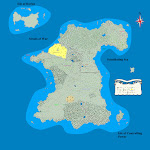- Spheres: Time, History, Knowledge, and Ancestors
- Gender: Male
- Alignment: True Neutral
- Power: Greater Deity
- Symbol: Hourglass
- Favored Weapon: Staff
- Influence: Patron of historians, scholars, and sages.
- Domains: Celerity, Fate, Planning, Time, Knowledge, Destiny
Description: Universally depicted as a grey-skinned, white-haired, wizened old humanoid, bearing an overly large hourglass and a staff.
Lore and Knowledge: The Timekeeper, Chronos is the oldest known deity besides Corbrin. It is said he has existed since the beginning of time, and will be around at the end of time. He is the one constant in the multiverse.
Followers: Chronos actually has few active followers. His existence is generally taken for granted. Only scholars and historians actively seek his guidance, as the prophets of Chronos are undeniably accurate in their predictions.
- Affiliated Organizations:
- Order of the Hourglass: The official church of Chronos.
- Timewalker’s Guild: This organization delves into the secrets of time, including manipulation and travel thru the medium.
- Hands of Chronos: This fanatic organization is devoted to stopping those who attempt to cheat time; liches, wizards, or those that try to extend their own lives.
Class Information:
Clerics: Clerics of Chronos tend to be lore keepers, and rarely venture out from their vault-like temples. Clerics of Chronos often serve as historians for their communities, and track family records. Clerics of Chronos must be partially neutral.
Clerics of Chronos always know what time it is, regardless of their environment. They cannot Turn/Rebuke Undead; instead, 3 times per day, plus their Charisma modifier, they can Slow one target, as the spell. A Will save DC 10 + 1/2 the cleric's level + Charisma modifier negate's the effect.
Class Skills: Concentration, Craft, Diplomacy, Heal, Knowledge (Arcana, History, Religion, The Planes), Profession, Spellcraft
Favored Soul: Favored souls of Chronos are often those naturally in tune with the flow of time. They can feel the passage, like water running over them. Favored Souls have an inherent bonus of +2 to their Initiative. They can be of any alignment.

